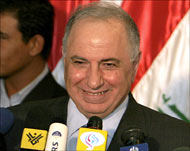Syrian exile wants to lead change
Rifaat al-Assad, the brother of former Syrian president Hafez al-Assad who went into exile after a failed coup, says he wants to return home to remove the government led by his nephew.

During a more than four-hour interview on Friday with The Associated Press at his office in Marbella in southern Spain, Rifaat al-Assad indicated that he may be willing to meet officials in the Bush administration to “benefit the American and Syrian people”.
Rifaat al-Assad said he has not been approached by any US official.
The Syrian government is under relentless US pressure, with accusations that it is either aiding or not stopping foreign fighters from crossing its borders into Iraq.
Syria’s Chalabi?
There’s speculation that with some hardliners in the US administration unwilling to accommodate Bashar al-Assad, Rifaat al-Assad could step in as a replacement.
Former CIA Middle East specialist Martha Kessler scoffed at the idea of Rifaat al-Assad trying to portray himself to the West as “Syria’s Chalabi,” referring to Ahmad Chalabi, the former Iraqi exile who got US support in his campaign against Saddam Hussein and is now a deputy prime minister in Iraq.
 |
|
One specialist was dubious |
“If anybody’s fallen for it, they’re in big trouble,” said Kessler, saying Rifaat al-Assad was linked to atrocities in Syria and may no longer have much support there because he has been away so long and because his brother cracked down on his allies.
Al-Assad, 67, insisted that he is not seeking to replace his 39-year-old nephew Bashar al-Assad, who inherited the presidency from his late father five years ago.
He said he wants to lead a peaceful movement for change in a country whose tense relations with the US threaten a head-on clash.
Syria under threat
“I noticed the country is being threatened from within and without,” said Rifaat al-Assad, seated at his desk with a huge Syrian flag behind him. “The country doesn’t enjoy stability.”
“It’s America’s right to defend its interests as it is natural for Syria to defend its interests. The affair must be resolved in a regional reconciliation,” said al-Assad, whose country was a close ally of the former Soviet Union at the height of the Cold War.
 |
|
Bashar al-Assad could be seen |
“I am not an admirer of the regime,” he said. “My meeting with you today would not have taken place had it not been for the situation in Syria.”
Rifaat al-Assad has spoken about returning before, but not gone home.
When his brother died, he claimed he should be Syria’s next leader, but Syria’s Baath party, the al-Assad clan and the all-important military closed ranks around Bashar al-Assad and he was reportedly threatened with arrest if he tried to enter his homeland.
Bashar under fire?
Now Rifaat may believe Bashar al-Assad has been weakened in Syria by the humiliation of having to give into US pressure and withdraw troops from Lebanon.
In the interview, Rifaat al-Assad said he had never supported Syrian meddling in Lebanon.
|
Rifaat al-Assad is “a symbol of the past whose name is linked Samir Atallah, |
There is speculation that some hardliners among the long-privileged ruling Alawites, the Muslim sect to which the al-Assads belong, are beginning to grumble about the “weakness” of Bashar al-Assad.
They see Bashar al-Assad’s decision to withdraw Syrian troops from Lebanon as capitulation, and may hope Rifaat al-Assad would be able to keep them in their privileged positions and satisfy the Americans at the same time.
But Samir Atallah, a Lebanese political analyst and writer, speaking on Lebanon’s LBC television, said it was unlikely that al-Assad would be allowed to go back.
“The Syrian leadership cannot afford such a symbol at a
time when it is contemplating change,” Atallah said.
Rifaat al-Assad is “a symbol of the past whose name is linked
to very big issues in Syria. These are matters that cannot be ignored”.